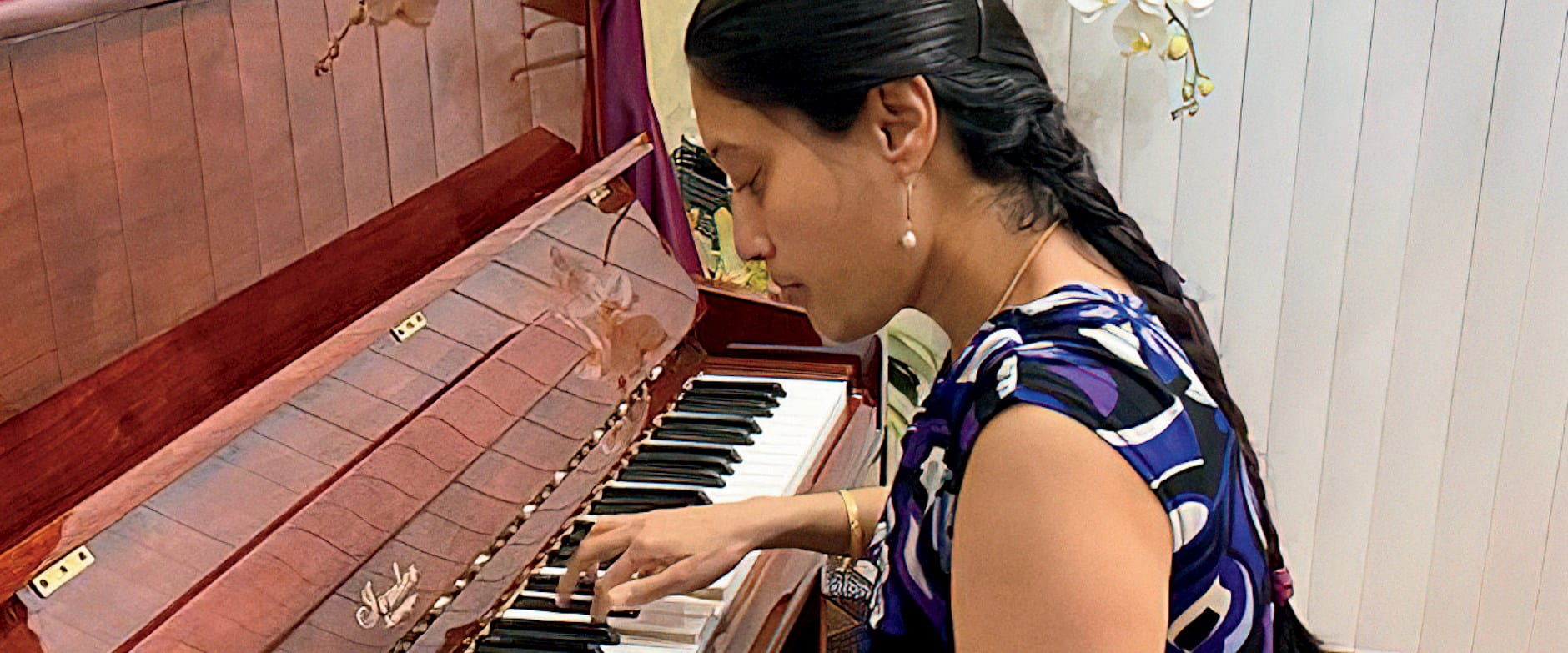Meena Prathima R. S. Kumba, ’09, was too busy studying to take in any live music when she was a student at Booth. But if she’d started piano back then, perhaps she would have been able to make the time.
Kumba, a finance manager at Paris-based logistics and supply chain company GEODIS, moved from India to the United States in 2003 to pursue a career shift from IT consulting to business. “I wanted to do more business strategy work,” she said. “That’s when I thought I should do an MBA. I had a good engineering background but no business knowledge at all.” Booth also gave her an opportunity to gain some softer business skills. “I didn’t know a lot of the cultural aspects of American business. The Booth education taught many nuances that I leveraged, like phrases we use and why we use them.”
Kumba now lives with her husband and 11-year-old son in Los Angeles. Giving her son a cultural education led to a discovery. She put him into piano lessons, and her son didn’t enjoy them a whole lot. “He was not very interested. He stopped after three or four years.” But she found herself drawn to piano’s art and theory. She started taking her own lessons two and a half years ago, switching to virtual instruction after the COVID-19 pandemic began.
Classical music in general, not to mention performing, was new to Kumba, who now enjoys playing pieces by Chopin, Mozart, and Tchaikovsky. “I didn’t grow up listening to this music. When I started taking lessons, it didn’t make sense in the beginning. No one from my family is related to art. Everyone was either a doctor or an engineer or a lawyer.” As a child, she expressed interest in possibly learning to play the traditional stringed veena. “My mom said, ‘You need to study,’” she recalled.
Now, after the workday is done and her family has had dinner, Kumba practices between 7 and 9 p.m. on her Irmler piano. Paradoxically, she thinks that taking the time to learn piano has made her better at time management. “As your playing improves, your productivity at work also improves. I feel good about myself because I’m able to manage so many things. I am able to push myself beyond my comfort zone and grow my skills.” she said. “It gives kind of a moral boost. I wish I had started it earlier.”
“I’m a finance person.…Piano music, when you’re playing, is all about expression, emotions. You have to bring the emotion with which the composer wrote the song. That’s using a different part of the brain. That’s a new lesson for me. As I am achieving that, I am pushing new boundaries and growing my skills.”
— Meena Prathima R. S. Kumba
Is practicing more fun for an adult than for a young child? “It depends on how you define ‘fun,’” she said. “But the improvement is fun to watch. When there are certain pieces or certain parts of the song that are difficult, but you get it after some hard work, it’s very satisfying.”
Learning the piano has been a comfort to Kumba during the past year’s stay-at-home measures, which gave her more time to practice without a work commute. “I was always looking forward to playing. It would have been boring if not for the piano,” she said. “I feel like I have accomplished something during this pandemic.”
The piano has also been an expressive outlet for a left-brained analyst. “I’m a finance person,” she explained. “We are like scientists who have to speak with data. Some excecutives use intuition in business, but at my designation level we have to be fact based. We are not using emotion in our work.” Piano is different. “Piano music, when you’re playing, is all about expression, emotions. You have to bring the emotion with which the composer wrote the song. That’s using a different part of the brain. That’s a new lesson for me. As I am achieving that, I am pushing new boundaries and growing my skills.”
A milestone for Kumba was participating in a recording for a virtual recital. She played a Tchaikovsky piece and a contemporary song called “Beethoven’s Silence” by Ernesto Cortázar II to be broadcast in a virtual recital, an experience she found nerve-wracking. “I was happy I finished that. It took lots of practice.” Postpandemic, she looks forward to more recitals. She’s ready to show the world what she’s learned.


